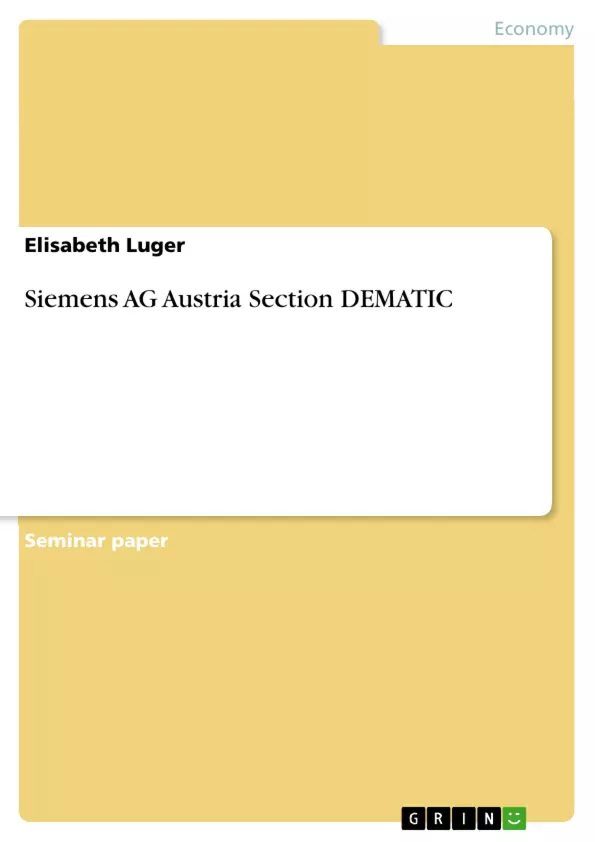While discovering that Siemens Austria is going to be too big as we could present it in one
hour we took a only one of the most successful parts of Siemens which is called Siemens
Dematic. Our company presentation is based on this particular part of the company - the
logistics division of Siemens AG Austria.
Followed by some history and general information we want to focus on our three special
topics Human Recourse Management, Outside Influences on Siemens and Cross Cultural
Management. For the critical revue we chose the Annual Report and some articles in Austrian
Newspapers, which you can find in the Appendix to our paper. Werner von Siemens, the founder, was born on the 13.th of December near Hanover. His
numerous innovative ideas, for example in the field of telegraphy made him to the visionary
in engineering history. To built his first telegraph he used just a piece of wire, one cigarette
packet, and as mall piece of iron.1
Due to collaborations with other nations in order to find innovative solutions, Werner von
Siemens built up a global network and consequently the today’s working multinational.2 He
started the expansion to England and Russia, later Asia and America.3 Today Siemens is to be
found in more than 190 countries.4Siemens AG Austria is the most successful of all Siemens
national companies around the world. As part of the “Global Network of Innovation” Siemens
Austria sees itself as an Austrian company with European and international ties and
orientation in a way as a “Regional Network of Innovation”. Therefore Siemens AG Austria
represents a special significance for the domestic economy and value added.5 The annual
report talks about a “ Corporate Citizenship” and refers to contributions to art and culture as
well as social matters. 6 [...]
1 Siemens, Werner von, Lebenserinnerungen, Prestel-Verlag München 1966
2 Siemens, Werner von, Lebenserinnerungen, Prestel-Verlag München 1966
3 Siemens, Werner von, Lebenserinnerungen, Prestel-Verlag München 1966
4 http://w4.siemens.de/annualreport_2002/overview.shtml
5 http://www/bereiche/cc/cchome/index.htm
6 http://www/bereiche/cc/cchome/index.htm
Table of Contents
- 1. Introduction
- 2. Siemens as a company
- 2.1 Annual Report
- 2.2 Media Reports with Comments
- 3. Inside Siemens
- 3.1 The Different Divisions
- 3.2 Division "DEMATIC"
- 3.2.1 Human Recourse Management (Author: Eva; Editor: Angela)
- 3.2.2 Outside Influences on Siemens DEMATIC
- 3.2.3 Cross Cultural Management
- 4. Summary
Objectives and Key Themes
This paper examines the Siemens Dematic division within Siemens AG Austria, focusing on three key topics: Human Recourse Management, Outside Influences on Siemens, and Cross Cultural Management. It critically analyzes the Annual Report and media reports to gain insights into the company's operations and its place within the broader Siemens network.
- The role of Human Recourse Management in Siemens Dematic
- External factors influencing Siemens Dematic's success
- Cross-cultural management within Siemens Dematic
- The significance of Siemens Dematic within the Austrian and global economies
- The company's commitment to corporate citizenship and innovation
Chapter Summaries
Chapter 1 provides an overview of the Siemens Dematic division, highlighting its role as a leading provider of logistics solutions. It also introduces the three key topics that will be discussed in the paper.
Chapter 2 explores Siemens as a company, delving into its history, global presence, and commitment to innovation. It also analyzes the company's Annual Report, focusing on key performance figures and market significance.
Chapter 2.1 provides a detailed analysis of the Annual Report, examining its key sections and highlighting both informative and problematic aspects.
Chapter 2.2 analyzes media reports about Siemens, focusing on articles that demonstrate the company's commitment to corporate citizenship and innovation.
Keywords
The primary keywords and focus topics of this paper include: Siemens Dematic, Human Recourse Management, Outside Influences, Cross Cultural Management, Logistics Solutions, Corporate Citizenship, Innovation, Annual Report, Media Reports, Siemens AG Austria.
Frequently Asked Questions
What is the focus of the Siemens Dematic presentation?
The presentation focuses on the logistics division of Siemens AG Austria, specifically examining Human Resource Management, Cross-Cultural Management, and outside influences.
What is "Corporate Citizenship" at Siemens Austria?
It refers to the company's commitment to social matters, arts, and culture, positioning itself as a responsible member of society.
How does Cross-Cultural Management play a role in Dematic?
As part of a global network, Siemens Dematic must manage diverse teams and international collaborations to maintain its innovative edge.
Who was the founder of Siemens?
Werner von Siemens founded the company; he was a visionary engineer known for his pioneering work in telegraphy.
What role does Siemens Austria play in the global network?
Siemens AG Austria is one of the most successful national companies within Siemens and acts as a "Regional Network of Innovation."
- Arbeit zitieren
- Elisabeth Luger (Autor:in), 2003, Siemens AG Austria Section DEMATIC, München, GRIN Verlag, https://www.grin.com/document/14033



